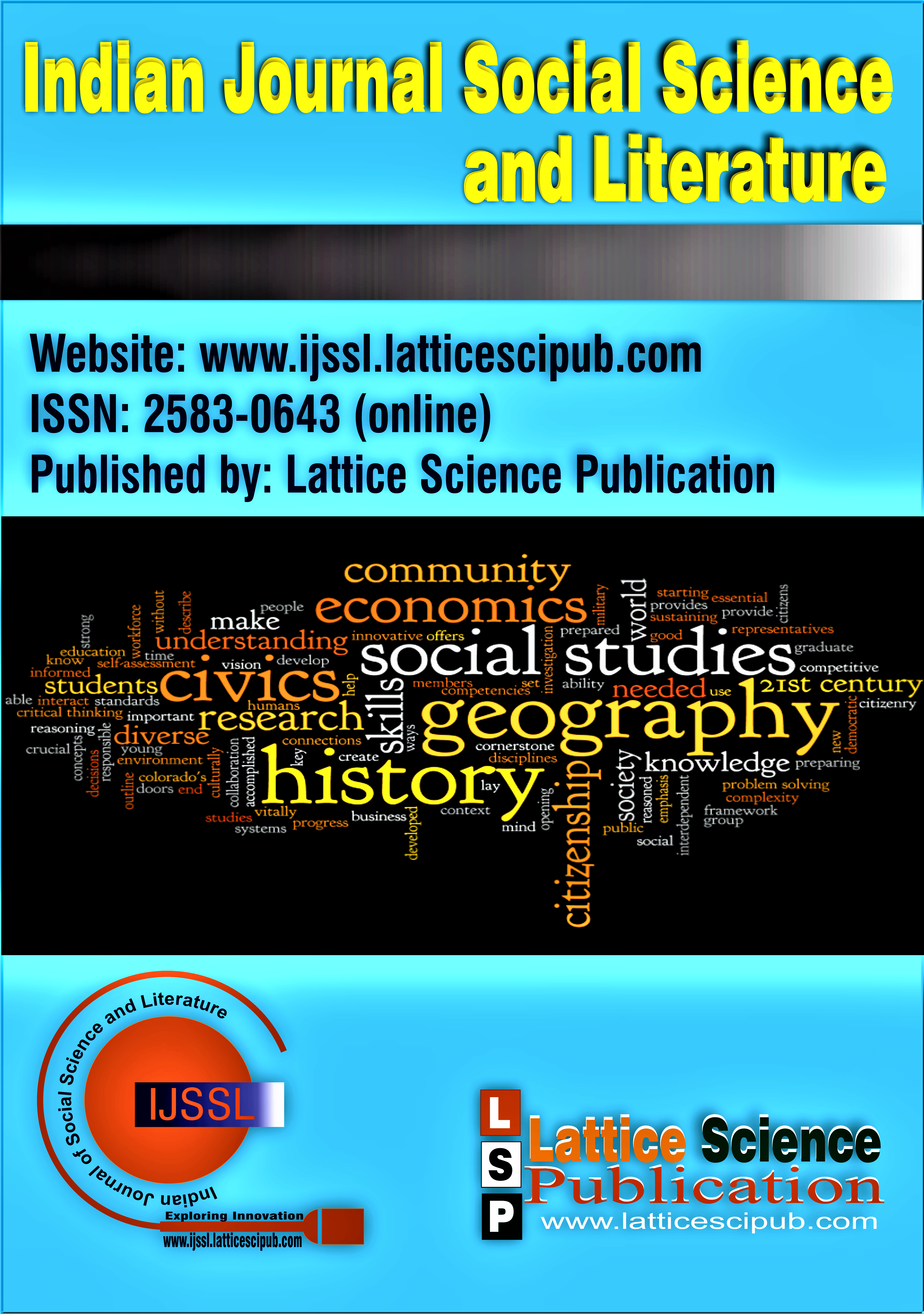Navigating Global and Local: Reddit's Influence on Community Formation and Identity Among Gen Z Indian Users
Main Article Content
Abstract
This study explores how Gen Z Indians navigate questions of identity, community, and culture on the global social media platform Reddit. Drawing on in-depth interviews with 15 Indian Redditors aged 18-25, we analyze their experiences through a theoretical framework that brings together key concepts from digital anthropology, postcolonial studies, and science and technology studies. Our findings reveal Reddit as a complex site of cultural negotiation where Indian youth construct hybrid identities, imagine communities beyond geographical boundaries, and grapple with the platform's affordances and limitations. However, we also highlight how these processes of meaning-making and community formation are deeply shaped by the enduring power asymmetries of coloniality and the digital divide in India. The dominance of English on the platform, the marginalization of Indian vernaculars and cultural referents, and the underrepresentation of lower-caste and working-class voices all point to the ways in which Reddit's promise of inclusivity and democratization remains unfulfilled for many Indian users. To make sense of these tensions and contradictions, we develop an analytical approach that foregrounds Indian Redditors' own cultural frameworks and meaning-making practices while also situating their experiences within larger structures of postcolonial power and inequality. This decolonial and pluriversal approach, we argue, is crucial for moving beyond one-size-fits-all models of digital sociality and attending to the irreducible diversity and specificity of Indian digital cultures. At the same time, we reflexively interrogate our own positionality as researchers and the limits of our inquiry, acknowledging the paradoxes of doing decolonial scholarship within a still largely Western-centric academic ecosystem. We thus offer our findings not as definitive conclusions but as an invitation to further conversation and critique, opening up new avenues for research and praxis at the intersections of Indian cultural politics, digital media, and decolonial theory. Ultimately, this study makes a case for the urgent need to decolonize our approaches to global social media platforms like Reddit and to center the lived experiences, cultural knowledges, and political aspirations of digital subjects at the margins. In doing so, we hope to contribute to a more expansive and pluriversal understanding of digital sociality – one that makes space for multiple ways of being and knowing online.
Downloads
Article Details

This work is licensed under a Creative Commons Attribution-NonCommercial-NoDerivatives 4.0 International License.
How to Cite
References
Massanari, A. (2017). "#Gamergate and The Fappening: How Reddit's algorithm, governance, and culture support toxic technocultures." New Media & Society, 19(3), 329-346. https://doi.org/10.1177/1461444815608807
Statista. (2022). "Countries with the most Reddit users 2022." Retrieved from https://www.statista.com/forecasts/1174696/reddit-user-by-country
IAMAI and Kantar. (2021). "Internet Adoption in India ICUBE 2020." Internet and Mobile Association of India.
Patel, R. (2019). "Young India and Digital Media: A Survey Report." Centre for Culture, Media & Governance, Jamia Millia Islamia.
Arora, P. (2019). "The next billion users: Digital life beyond the West." Harvard University Press. https://doi.org/10.4159/9780674238879
Anderson, B. (1983). Imagined communities: Reflections on the origin and spread of nationalism. Verso Books.
Gruzd, A., Wellman, B., & Takhteyev, Y. (2011). Imagining Twitter as an imagined community. American Behavioral Scientist, 55(10), 1294-1318. https://doi.org/10.1177/0002764211409378
Berger, P. L., & Luckmann, T. (1966). The social construction of reality: A treatise in the sociology of knowledge. Penguin UK.
Bhabha, H. K. (1994). The location of culture. Routledge.
Kraidy, M. M. (2005). Hybridity, or the cultural logic of globalization. Temple University Press. https://doi.org/10.26530/OAPEN_626979
Rainie, H., & Wellman, B. (2012). Networked: The new social operating system. MIT Press. https://doi.org/10.7551/mitpress/8358.001.0001
Zuckerman, E. (2013). Digital cosmopolitans: Why we think the internet connects us, why it doesn't, and how to rewire it. W. W. Norton & Company.
Lindlof, T. R., & Taylor, B. C. (2017). Qualitative communication research methods. Sage Publications.
Marwick, A. E., & boyd, d. (2011). I tweet honestly, I tweet passionately: Twitter users, context collapse, and the imagined audience. New Media & Society, 13(1), 114-133. https://doi.org/10.1177/1461444810365313
Wellman, B., Quan-Haase, A., Boase, J., Chen, W., Hampton, K., Díaz, I., & Miyata, K. (2003). The social affordances of the Internet for networked individualism. Journal of Computer-Mediated Communication, 8(3), JCMC834. https://doi.org/10.1111/j.1083-6101.2003.tb00216.x
Gillespie, M., Osseiran, S., & Cheesman, M. (2018). Syrian refugees and the digital passage to Europe: Smartphone infrastructures and affordances. Social Media + Society, 4(1), 2056305118764440. https://doi.org/10.1177/2056305118764440
Risam, R. (2018). New digital worlds: Postcolonial digital humanities in theory, praxis, and pedagogy. Northwestern University Press. https://doi.org/10.2307/j.ctv7tq4hg
Pennycook, A. (2007). Global Englishes and transcultural flows. Routledge. https://doi.org/10.4324/9780203088807
Braun, V., & Clarke, V. (2006). Using thematic analysis in psychology. Qualitative research in psychology, 3(2), 77-101. https://doi.org/10.1191/1478088706qp063oa
Srivastava, A., & Saxena, Dr. U. K. (2023). Digital Media and Media literacy. An Analysis of the Contribution and Effect of social media in Media Literacy. In Indian Journal of Mass Communication and Journalism (Vol. 3, Issue 1, pp. 17–22). https://doi.org/10.54105/ijmcj.a1051.093123
P. Uma Rani, Padmalosani, Impact of Social Media on Youth. (2019). In International Journal of Innovative Technology and Exploring Engineering (Vol. 8, Issue 11S, pp. 786–787). https://doi.org/10.35940/ijitee.k1138.09811s19
Pancham, A., Sharma, D., Sharma, V., & Patil, H. (2020). Implementing System for Rating Generation by Analysis of Social Media. In International Journal of Engineering and Advanced Technology (Vol. 9, Issue 3, pp. 638–643). https://doi.org/10.35940/ijeat.c5330.029320
B., P. V., & Kundan M, P. (2020). How Social Media users’ Drive Influences Purchase Intention in Indian Fashion Industry. In International Journal of Recent Technology and Engineering (IJRTE) (Vol. 8, Issue 6, pp. 5153–5160). https://doi.org/10.35940/ijrte.f9944.038620
Joshi, S. C., Gupta, K., & Manektala, S. (2022). Misinformation, Public Opinion, and the Role of Critical Thinking. In International Journal of Management and Humanities (Vol. 8, Issue 9, pp. 15–18). https://doi.org/10.35940/ijmh.i1483.058922





